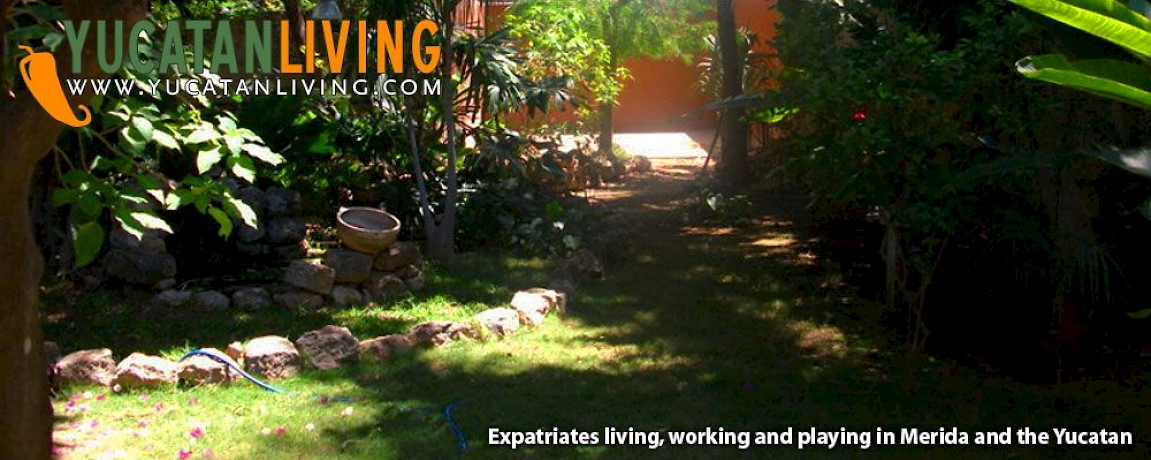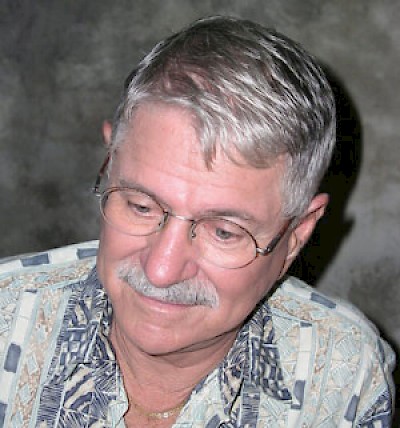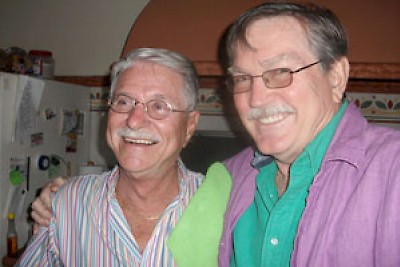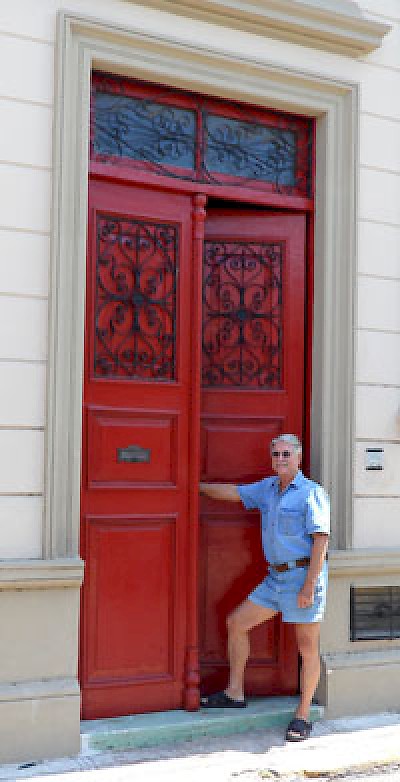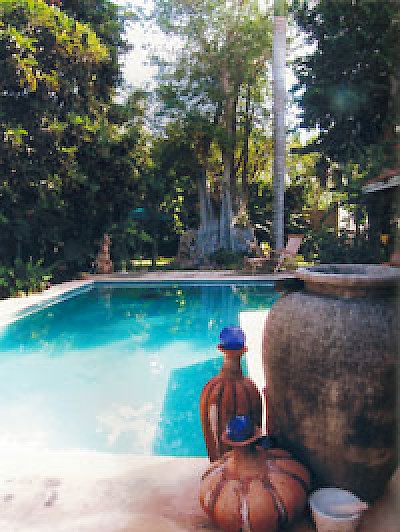Grant Spradling
YL: When did you move to the Yucatan and from where did you move?
Grant: I rented a room in Merida about twenty five years ago, 1987. I continued to commute back and forth from Key West for the next fifteen years.
YL: Why did you move?
Grant: I started coming here when I resigned as Arts Council Director in the Florida Keys and Key West. There were too many distractions in Key West for me to concentrate on writing, and I had been wanting to devote more time to writing for a number of years.
YL: Why did you choose the city you now live in over other places in the world?
Grant: It was easy to get here from Florida. Also, I discovered the accepting nature and warmth of the people of the Yucatan. There were some similarities with Key West: the weather and, back in the eighties, I could get on a bike and go wherever in Merida I wanted to go.
YL: Did you buy right away or rent first? Do you think you made the
right decision?
Grant: We rented a room near Santiago for about two years. We weren’t looking to buy but my partner and I discovered a house that captivated us. I mean really! It seemed as if the house spirit said, “Save me!” We had no idea that we were on the edge of what was referred as Gringo Gulch. We thought that we were the only Americans in the neighborhood. Of course the community was smaller and quite different in nature back then.
Was buying here the right decision? Several years ago, I told a writer from the Los Angeles Times that I had decided it was time to go. By then I was an “old timer” and I guess I was distressed by the rapid change in the character and makeup of the expatriate community. About two weeks later, after the wire services picked up the story and I was hearing from friends in Maine, I was sitting out in our garden and a voice said, “Are you crazy?” So, needless to say, I didn’t leave.
Lately I have become aware of a burgeoning group of writers among the expatriates. Two of the writers have been great helps for my own work. We maintain a condo in Amarillo, Texas to be near family, but I expect to end my days here. I cannot imagine a more felicitous place than our Merida home.
YL: Are you doing now what you intended to do when you moved here? If not, why not?
Grant: I am doing exactly what I wanted to do! Oh I’ve gotten sidetracked more than once. For instance, being the president of the Merida English Library took quite a lot of attention for awhile. But I am back on track now and writing. I am well into a book called The Palenque Murder, inspired by the real murder of a friend at Palenque.
YL: What are the most interesting things about living here for you?
Grant: Oh, my... there is so much! I love the sense of a living Native American culture. The buildings and stone here reek of history. I look at the profile of some of our Yucatecan friends and they could be models for the carved reliefs on the ruins. I treasure the enduring friendships of our expatriate friends, the encouragement from fellow writers, the banyan tree in our garden, our garden and home, the Yucatan Symphony and the museums.
YL: What do you absolutely love about living here?
Grant: The people!
YL: What do you miss from your "former life"?
Grant: Friends, of course, but not much else. I have always been happy where I lived.
YL: What don’t you miss from your "former life"?
Grant: Social climbing.
YL: What is your favorite local food?
Grant: Cochinita!
YL: What is your favorite time of year here and why?
Grant: November. The rainy season is about over but the countryside is still green. Things are cooling down but it is plenty warm enough to swim.
YL: Where do you take guests who visit you here to show them something really special?
Grant: One of our friend’s homes, a few sleepy fishing villages and the haciendas.
YL: The last time you went out to dinner, where did you go and why?
Grant: Rescoldos. It is walking distance. It is in the Santa Ana art district. The Mediterranean food and wood-fired oven appeal to us.
YL: How is the city where you live different for residents than it is for tourists?
Grant: Much of Merida’s beauty and interest is behind our doors, where there are cool green spaces. While there are many good restaurants and we go out a lot, much of our entertaining is done in our homes.
YL: Do you have friends from the local community or do you pretty much hang with the expat crowd?
Grant: Over the years I have developed many close friends from the local community. All of them who are still living here remain very important. However I would say that I socialize more in the homes of other expat friends.
YL: Did you speak Spanish when you moved here? Where did you learn Spanish (if you did)? Is the language barrier a problem for you in your daily life?
Grant: I did not speak Spanish before coming here. I have studied off and on. I do not find my limited Spanish a barrier. Folks are patient and seem to appreciate my effort. We communicate.
YL: What interesting Spanish word or saying have you learned lately? What does it mean and how did you learn it?
Grant: Mucho gusto, a pleasure to meet you. El gusto es mio. The pleasure is mine.
YL: Are you a Mexican citizen? Do you plan to become one?
Grant: I have an FM2 and will soon become a resident, but not a citizen.
YL: Have you traveled much within Mexico? If so, where and what has been your favorite location to visit? What did you see there that you liked so much?
Grant: I liked the university feeling of Xalapa and the cool climate. I liked the rich artisan work of Oaxaca. When possible I take friends to the Calakmul ruins south near the Guatemala border. It has an undiscovered feel, and is a major archaeological site.
YL: How are you treated by Mexicans? Do you feel resented or welcome?
Grant: No resentment at all. Here in Merida I am treated with friendly respect. I have white hair and I sense that age is appreciated more here than north of the border.
YL: How do you feel about the economic prospects of Mexico? Of the Yucatan?
Grant: I believe that Merida and particularly the long sandy coast of the Yucatan will prosper greatly in the coming years.
YL: What are some changes you are hoping for in the city in which you live? Do you see any progress towards these changes?
Grant: Things seem to be moving in the right direction.
YL: What are your plans for the future here?
Grant: I plan to keep writing. If I can be of help, I would like to participate in and encourage the burgeoning expatriate writing ferment, and to continue to enjoy my Yucateco and expatriate friends.
YL: What is the one most important piece of advice you would give someone buying property and/or planning a move to the Yucatan?
Grant: If you are impatient, you don’t belong here. Soon after I arrived, a priest acquaintance, who had lived in the US, told me, “In your country, time is money. Here time is for living. “
YL: If you could say something to all the people of Mexico, what would you say?
Grant: Thank you!
YL: If there is anything else you would like to add for our readers (people interested in or considering moving to the Yucatan, former Yucatecans, people planning to visit for an extended tour…), please add them here:
We expats are guests in Mexico. I suggest you act like you are a guest. Where and when you can, help and contribute as a good guest. Leave criticism of the way things are done at home backhome where it belongs.
****
Grant Spradling has just published his first novel, Maya Sacrifice. “When he learns of the death in the Yucatan of his beloved friend, wealthy poet-opera librettist, Quincy Bruster, calls his friend David Ward for help. Hackles of suspicion are raised as the pair of amateur detectives travel to Mexico to bring home the murdered man’s body. "
Spradling has also authored a book of short stories, From High in the Mulberry Tree, countless articles and is the co-creator of two volumes of Imaging the Word. He lives in Merida with his partner of forty-three years, Clifford Ames, and two Maya dogs.
Grant will be signing his book on April 21 at 11 AM at the Merida English Language Library.




